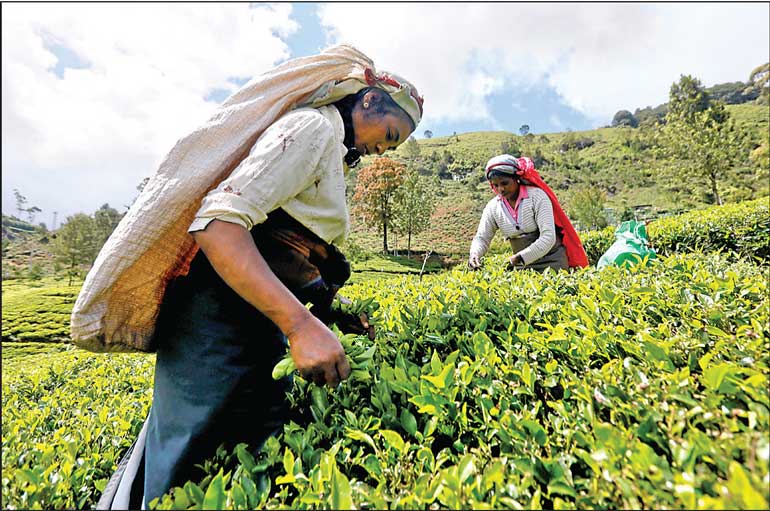Saturday Feb 21, 2026
Saturday Feb 21, 2026
Friday, 3 September 2021 00:00 - - {{hitsCtrl.values.hits}}

AFP: Sri Lanka’s drive to become the world’s first 100% organic food producer threatens its prized tea industry and has triggered fears of a wider crop disaster that could deal a further blow to the beleaguered economy.
President Gotabaya Rajapaksa banned chemical fertilisers this year to set off his organic race but tea plantation owners are predicting crops could fail as soon as October, with cinnamon, pepper and staples such as rice also facing trouble.
Master tea maker Herman Gunaratne, one of 46 experts picked by Rajapaksa to guide the organic revolution, fears the worst.
“The ban has drawn the tea industry into complete disarray,” Gunaratne said at his plantation in Ahangama, in rolling hills 160 kilometres (100 miles) south of Colombo.
“The consequences for the country are unimaginable.” The 76-year-old, who grows one of the world’s most expensive teas, fears that Sri Lanka’s average annual crop of 300 million kilogrammes (660 million pounds) will be slashed by half unless the Government changes course.
Sri Lanka is in the grip of a pandemic-induced economic crisis, with gross domestic product contracting more than three percent last year, and the Government’s hopes of a return to growth have been hit by a new coronavirus wave.
Fertiliser and pesticides are among a host of key imports – including vehicles and spare parts – the Government has halted as it battles foreign currency shortages.
But tea is Sri Lanka’s biggest single export, bringing in more than $ 1.25 billion a year – accounting for about 10% of the country’s export income.
Rajapaksa came to power in 2019 promising subsidised foreign fertiliser but did a U-turn arguing that agro chemicals were poisoning people.
Gunaratne, whose Virgin White tea sells for $ 2,000 a kilo, was removed last month from Rajapaksa’s Task Force for a Green Socio-Economy after disagreeing with the president.
He says the country’s Ceylon tea has some of the lowest chemical content of any tea and poses no threat.
The tea crop hit a record 160 million kilos in the first half of 2021 thanks to good weather and old fertiliser stocks but the harvest started falling in July.
Sanath Gurunada, who manages organic and classic tea plantations in Ratnapura, southeast of Colombo, said that if the ban continues “the crop will start to crash by October and we will see exports seriously affected by November or December”.
He told AFP his plantation maintained an organic section for tourism, but it was not viable. Organic tea costs 10 times more to produce and the market is limited, Gurunada added.
W.A. Wijewardena, a former Central Bank deputy governor and economic analyst, called the organic project “a dream with unimaginable social, political and economic costs”.
He said Sri Lanka’s food security had been “compromised” and that without foreign currency it is “worsening day by day”.
Experts say the problem for rice is also acute while vegetable growers are staging near daily protests over reduced harvests and pest-affected crops.
“If we go completely organic, we will lose 50% of the crop, (but) we are not going to get 50% higher prices,” Gunaratne said. Tea plantation owners say that on top of the loss of earnings, a crop failure would cause huge unemployment as tea leaves are still picked by hand.
“With the collapse of tea, the jobs of three million people will be in jeopardy,” the Tea Factory Owners Association said in a statement.
Plantations minister Ramesh Pathirana said the Government hoped to provide organic compost in place of chemical fertilisers.
“Our Government is committed to providing something good for the tea industry, fertiliser-wise,” he told AFP.
Farmers say Sri Lanka’s exports of cinnamon and pepper will also be affected by the organic drive.
Sri Lanka supplies 85% of the global market for Ceylon Cinnamon, one of the two leading types of the spice, according to United Nations figures.
Still, Rajapaksa remains confident in his course, telling a recent UN summit that he was confident that his organic initiative will ensure “greater food security and nutrition” for Sri Lankans.
He has called on other countries to follow Sri Lanka’s move with the “bold steps required to sustainably transform the world food system”.